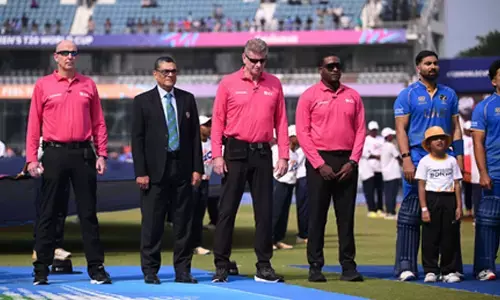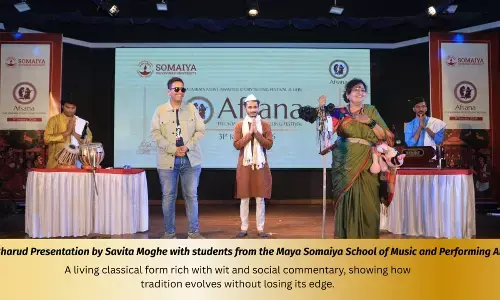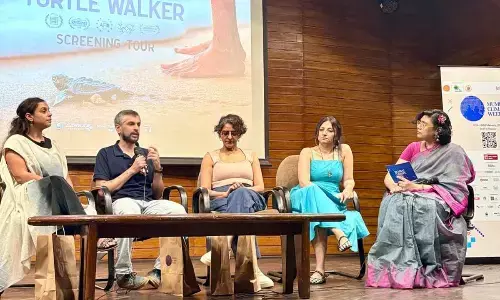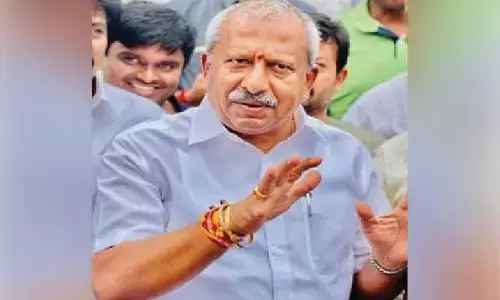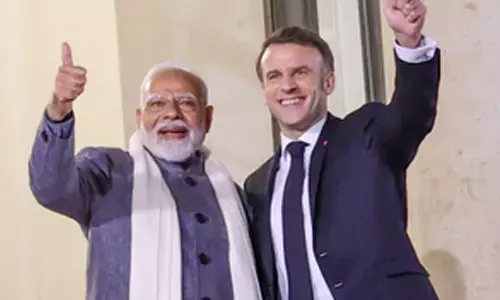MyVoice: Views of our readers 10th November 2024

MyVoice: Views of our readers 9th February 2026
The writer V Ramu Sarma has analysed correctly in is bold talk that Rahul Gandhi in pursuit of power is courting controversial remarks every other day to be in the news is absolutely correct. At the outset, he is often coming out with absurd statements diluting his political narrative
Who's manipulating minds?
The writer V Ramu Sarma has analysed correctly in is bold talk that Rahul Gandhi in pursuit of power is courting controversial remarks every other day to be in the news is absolutely correct. At the outset, he is often coming out with absurd statements diluting his political narrative. This is nothing but only making a mockery of himself and his party. His latest outbursts comparing East India Company with Indian corporates is not only ridiculous and laughable but also goes to reveal his abject failure to know the history and ground realities of the country. In a way, the mindset of Rahul Gandhi has to change with a willingness to learn first about immense contribution of private sector to our economy instead of making wayward statements that only hurt the conscience of the people and do not help any cause.
–K R Srinivasan, Secunderabad
***
It is clear that Rahul Gandhi is testing waters in his attempt to create a new narrative against the ruling BJP. He seems to be having a long list of agenda to follow in creating deliberately a false narrative to destabilise the government in power, without any plans to go about in the wake of INDI group coming to power in managing things and running the show. In short, his “mohabbat ki dukan” is turning out to be “nafrat ki saamaan” for the country that is even landing his political allies in needless hot water. Rahul Gandhi is reeling out one idea after the other from his arsenal that is purely aimed at destabilising the country's cultural, social and religious fibre. One wonders why he does this by virtue of calling himself an Indian, but his mentality and attitude are severely askance. Rahul Gandhi’s notions about India’s private sector and corporates will put to shame the diehard Left parties in India. The Left entity is not as vociferous as Rahul Gandhi in stonewalling against liberalisation. Let us see to what extent Rahul Gandhi’s narrative will sell before the electorate of Maharashtra and Chhattisgarh.
– S Lakshmi, Hyderabad
***
This has reference to daringly drafted Bold Talk "Shift In Rahul's Rhetoric" (9-11-24) in the face of Maharashtra Assembly elections which are a few days away from now. Rahul's saying boldly about colossal wealth creation, shrinking responsbility of institutions to people, government inability to generate jobs for youth cannot totally be ignored. Rahul Gandhi's Congress is more favouring non-Hindus and it is apprehended that all welfare schemes will first go to minorities. Former PM PV Narasimha Rao, the Father of Liberalisation, Privatisation and Globalization, really changed the face of the country, but he was insulted beyond explanation by the Congress government under Manmohan Singh's administration during his decade's tenure as PM. Elections are the main platforms to criticise contesting parties' policies, coinage of new slogans, showing rosy pictures on palms and later conveniently throwing the blame on opposition parties claiming hindrances from them. This political game is not new to people. BJP also did not fulfil its many promises. Who to blame? People are voting only for such ones.
– N S K Prasad, Hderabad
***
I am no fanboy of Rahul Gandhi, but it is the first time that more focus is on the opposition by the media than it is on the government. He has clarified that he is not against business but this crony capitalism in the nation is creating all benefits for the big business houses and the vast majority of people are struggling to make a decent living. Every week there is news of some company being taken over by some big conglomerate. This is not good new for the nation. Had it been in America, the anti-trust laws would have kicked in. Income disparity is rising and all top-end luxury items are selling well including villas and big houses. Luxury cars are doing better than the regular ones. All this clearly shows that wealth is being concentrated in too few hands. How many articles have been written against those who have willfully refused to pay the banks for the loans? Why is the rupee today at an all-time low of over 84 to the dollar? Is it because of Rahul Gandhi? It is time the media and journalists begin to question the Modi government instead of attacking Rahul Gandhi all the time!
–Anthony Henriques, Mumbai
***
Being a political leader, Rahul Gandhi has his own style of delivering speeches or comments. However, all the political leaders are not encyclopedias with updated scenarios and situations. Their advisors may keep the agenda and the points ready for the political speakers. Every political leader's speech is keenly monitored by the people. They know how to evaluate each political leader and their speech. Rahul Gandhi has good experience in canvassing as a leader. Thus, he knows how to convince and impress a large number of people. Let the people decide whether heis on the right track or moving against their interests. People are always the judges to allot ranks to the political leaders periodically.
– G Murali Mohan Rao, Secunderabad
***
I think Rahul Gandhi's comments on private sector are misquoted. BJP is trying to create a euphoria that Rahul Gandhi is against big business. PM Modi says Congress talks of "Mohabbat ki dukaan" and now it is "Jhoot ki Dukaan", but people know very well that who are the masters in talking 'Jhoot and Jumlas.' In fact, Rahul spoke at Maharashtra Swabhiman Rally in Mumbai and cleared that he was not against business but against monopoly. He said that a new racial monopoly would replace it. In fact, he talked about the Modi government benefiting big business companies, especially Adani Group, and he clarified that he supports jobs, business, innovation and competitiveness. He said that economic system will develop when there is a free sector for all and there should be innovation and competitiveness in business. So, Rahul Gandhi is only against business monopoly and not against private sector and his opponents are trying to portray Rahul Gandhi as anti-business. So, the claims of Rahul Gandhi's rhetoric shift from "Mohabbat ki Dukaan" to "Jhoot ki Dukaan" is extremely a false notion created by his opponents.
– Zeeshan, Kazipet
The PM who loved children so much
November 14 is celebrated as Children's Day to commemorate the birth anniversary of Jawaharlal Nehru, the first Prime Minister of India. An eminent freedom fighter, great leader, noble humanist, social-democrat, nationalist, idealist, statesman, visionary, author and orator, Nehru is remembered on the day and the whole nation pays glowing tributes to him for his most significant service to the nation and his role in shaping India into the modern country. Though born with a silver spoon in his mouth, Nehru with his enormous love for his mother country abandoned his almost princely and luxurious life and got himself immersed in the freedom movement of the country against the colonial rule under the leadership of Mahatma Gandhi, sacrificing his life for the sake of his country.
The reason to celebrate Nehru's birth anniversary as the Children'sDay is that Nehru loved children so much. Though so busy as the Prime Minister, Nehru never missed the opportunity to spend some of his free time in the cheerful company of children, smiling and talking to them happily like a child. That's why he is affectionately called "Cha Cha Nehru" by children. Nehru wished that children should be healthy, happy and educated. He advocated for the rights and education of children. Nehru believed "The children of today will make the India of tomorrow. The way we bring them up will determine the future of the country."
Just as he loved red roses and always wore a red rose on his coat, Nehru loved and treated children like tender blossoms. He views " Children are like buds in a garden and should be nurtured carefully and lovingly as they are the future of the nation and citizens of tomorrow. Only through the right education of children, a better order of society can be built up."Children's Day is celebrated in schools as a kind of children's festival by conducting various competitions and cultural activities for children. On children's day, the whole nation remembers the great patriotic services of Jawaharlal Nehru, the first Prime Minister of India who brought glory to India as a great son of Mother India.
– Dr Venugopala Rao Kaki, Kakinada
Good policy comes to naught
In united Andhra Pradesh, the state government had introduced and implemented hundred per cent reservation for teaching jobs to local tribals in scheduled areas, the areas with preponderance of tribals notified by the President under constitutional scheme. It was first introduced and implemented in 1986 when N T Rama Rao was the Chief Minister and S R Sankaran was principal secretary as GO 275. Later, it had been continued as GO 3 from 2000 as the former was struck down by Administrative Tribunal. Recently, the GO3 has also been set aside by the Supreme Court, saying that it is an unconstitutional attempt as it violates 50 per cent cap on reservations and ordered both Telugu states to refrain from resorting to similar attempts.
But, actually the order of providing all teacher jobs to local tribals there in scheduled areas had a historical necessity and constitutionally mandated goal i.e., to empower the downtrodden to reach the level of mainstream with special plans in place. Commonly, the scheduled areas are with limited, difficult or no access to outer world and are also with lack of basic amenities. So, the employees from outside more often than not feel uninterested as if they are on punishment duty. They are also not fluent with local dialect leading to ineffective communication with students and parents. On the other hand, there were adequate number of eligible educated local youth, waiting for some employment, who could serve the community needs better by being available always, communicate and mingle easily, had they been given a chance.
Reservation to local tribals is a well thought out policy intended to achieve better results. The better lives of job holders could inspire others to get educated and compete for good life. The positive impact it created on socio-economic plane in the community cannot be overstated. The cessation of the said arrangement may jeopardize the progress.
The rule of fifty percent cap on reservations doesn't need to be applied in scheduled areas where near total (preponderance) population is tribals subject to a special governance mechanism. The Governor is empowered to modify any act of parliament or state legislature to suit the needs of scheduled area.
So it's better for two Telugu states to conduct socio-economic impact study of GO 3, the need for it in view of growing unemployment, and other related issues there and convince the court with facts and figures in favour of that well intended attempt.
– Dr DVG Sankara Rao, Vizianagaram
A MIXED LEGACY
Chief Justice DY Chandrachudhas left a mixed legacy. On assumption of office as the Chief Justice of India two years ago, he was hailed as a “rockstar judge”. All agree on his brilliance, perspicacity, fecundity, progressive jurisprudence and constitutional vision.
He delivered quite a few landmark and path-breaking judgments. He upheld the right to privacy and declared it a fundamental right, decriminalized homosexuality, declared electoral bonds illegal, gave abortion rights to unmarried women and championed gender equality and opened the doors of Sabarimala temple to women of all ages. He pithily said, ‘Dissent is the safety valve of democracy’. It still resonates with us. He stood for the protection of the country’s weak and vulnerable citizens. He urged the government to empathise with the migrant workers during the Covid-19 pandemic. He ensured the livestreaming of court proceedings. He did many more good things.
Nevertheless, he has given the impression of being “in awe of power” and an “Establishment man”. He conveniently overlooked the requisite to consult the state, meaning the people of the state or their representatives and not the Governor, while upholding the abrogation of Article 370. His revelation that he relied on “divine help” to write the Ayodhya judgment when he should have relied on evidence reduced his stature. It was quite unlike him to say that his devotion to a deity helped him make up his mind in the case; still he said it. On the whole, Justice Chandrachud could have been less subjective, selective and fallible.
– G David Milton, Maruthancode, TN
Article 370 is a closed chapter
The J&K assembly passing a resolution for the restoration of Art. 370 and 35A is more of political in nature aimed raising the emotions of the local population rather than the one made with conviction. All Kashmiris including the political leaders know that there is no way special status for the J&K can be restored as there is almost unanimity between the ruling and opposing
national parties.
The Congress party whose leader Rahul Gandhi spoke about in the election campaign could not venture to include that promise in the J&K election manifesto. Even at the time of passing the resolution the Congress MLAs kept neutral. That was the political game of Congress which may not fetch it any political dividend. The BJP on the other hand fulfilled its decades long promise of abrogation of Art. 370. Both those Articles should not have been in the constitution in 1950 as those Articles encouraged the secessionist activity in the name of seeking Azad.
Kashmir, after the abrogation of Art. 370, is witnessing great infrastructure development both on road, railway, power and irrigations fronts.
The potential of J&K in its resources needs to be fully utilized and that is possible only when political parties cooperate with one another to achieve the national objective of integrating the J&K with the rest of the country. Congress needs to control its political partner National Congress to accept the reality of abrogation of Art. 370 and their futility of making any demand for the restoration as such a demand will encourage the terrorists to venture out in killings of innocents.
– Dr Duggaraju Srinivasa Rao, Vijayawada
Need for more care during menopause
Ref: " Supporting Mental Health for Women going through Menopause" (Nov 9).Menopause is that phase in every Woman's life which marks the end of a woman's fertility and her reproductive years. It presents itself as a range of symptoms and this transition begins between ages 44 and 55 years,with the average age being 50 years. Menopause occurs when the ovaries stop producing eggs and there is a gradual decline in the female hormone estrogen with complete cessation of menstrual cycles. Apart from women experiencing physiological changes with the onset of menopause,it is the emotional and psychological symptoms that make the menopause phase difficult.
It actually begins as perimenopause, with fluctuating hormone levels and monthly cycles. Decreased sleep cycles, insomnia, restlessness and fatigue are also most common. Sudden mood swings, anxiety, forgetfulness, irritability, feelings of loneliness and isolation,outbursts of Anger and feeling as though no one understands them are experienced by most Women. Along with decrease in estrogen, menopause also leads to osteoporosis, loss of bone health and bone density in women .
There is every need to create awareness among women regarding the phase of menopause and post menopausal health. Women need family support and emotional assurance during this tough phase of their lives.Talking to their peer groups and sharing their experiences with other women will help deal with anxiety and irritability.
– Parimala G Tadas, Hyderabad
Vaccines: Humanity’s greatest achievement
The global vaccine drives of the second half of the 20th century are one of humanity’s greatest achievements. Vaccination is like a lifelong shield that protects our body from harmful diseases. Vaccines prepare our immune system to fight off infections by recognising and combating viruses and bacteria, reducing the risk of illness. The deadly diseases such as smallpox, polio, measles have been greatly reduced or even eradicated in many countries due to universal vaccination campaigns. By recognising the importance of vaccination, every year on 10 November, the world comes together to observe “World Immunisation Day” to bring awareness about the significance of timely vaccination. However, the World Immunisation Week is also celebrated every year during the last week of April.
Vaccines protect all ages from infants to elderly, and also people with low immunity. Immunisation programs around the globe is preventing 3 million deaths annually, according to WHO studies. The Immunisation benefits communities by reducing healthcare costs, supports a healthier future, prevents the spread of infectious diseases, reduces the risk of serious illness, protects vulnerable population, contributes to herd immunity, increases overall community and global health.
The key vaccines that are crucial for protecting public health are childhood vaccines (MMR, DPT, Polio), adult vaccines (Influenza, Tdap), shingles vaccines, travel vaccines(Hepatitis A and B, Typhoid and Yellow Fever Vaccines) and so on. Today there are 13 universally recommended vaccines across the life course, and 17 additional vaccines with context dependent recommendations. The Expanded Program on Immunisation (EPI) proposed by WHO was established to ensure that all children have access to vaccines, regardless of their socioeconomic status. Let’s make it possible for everyone to benefit from the life-saving power of vaccines by covering every newborn with universal immunisation programs implemented by governments. collective action is needed to protect people from vaccines-preventable diseases for the well-being of tomorrow.
–Dr Burra Madhusudhan Reddy, Karimnagar


